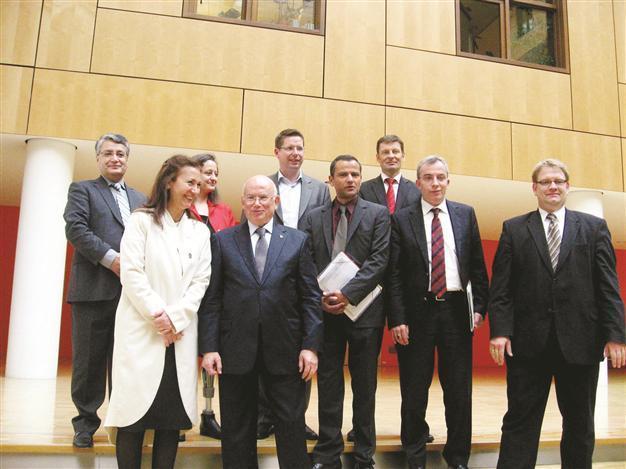Is the right eye of German intelligence closed?
ERFURT / BERLIN - Hürriyet Daily News

Turkish MPs with their German counterparts investigating the neo-Nazi murders. DAILY NEWS photo
Sitting in the middle of a dozen
German parliamentarians, Sebastian Edathy, the head of the federal parliament’s inquiry commission on a neo-Nazi cell that killed 10 people over the space of almost a decade without being detected, asked the first question to the man in front.
“In light of the recent information, looking back, would you have acted differently?”
“No. We would not have done anything differently. We made an impeccable investigation,” said Osta Kimmel, who was responsible for investigating the series of murders targeting immigrants between 2000 and 2006. The neo-Nazi cell was only discovered by chance last November, when two of the suspects committed suicide in order to avoid being captured by the police.
The exchange in parliament was witnessed by a large crowd that included journalists, members of the Turkish community, as well as a delegation from the Turkish Parliament that was in Berlin last week upon the invitation of the German government. In the first hour of the session, the opposition Social Democratic Party (SPD) deputy Edathy repeatedly questioned Kimmel on why he had not transferred the issue to the federal authorities.
The fact that the trio who committed the murders - one of whom is now in prison - were able to slip the radar of security forces for so long, has raised criticism about a lack of co-operation between the different arms of law enforcement. There are, however, concerns that the problem does not merely come from a lack of coordination.
One of the crucial unanswered questions remains as to why it was that security services blamed the murders on the Turkish mafia at the time, while a right-wing motive was never investigated. While the media named the murders the “kebab murders,” the investigation commission that was set up in the state of Bavaria, where killings also took place, was called “the Bosphorus Commission.”
“Despite the fact that there have been many incidents motivated by xenophobia since 1989, suspects were initially looked for among the relatives of the victims. This is a scandal,” said Martina Renner, from the leftist Die Linke, who is the deputy head of the commission that was set up in the local parliament of Thüringen where three suspects were born. “We need to examine whether security forces had a prejudiced approach,” she told the Turkish parliamentary delegation visiting Erfurt, the capital of Thüringen. The trio was suspected of several bomb attacks in the 1990s in Thüringen, but was able to make their traces disappear.
“Because in the past there have been murders among Turks, maybe there was a racial prejudice among the police that made them automatically think that these murders were committed by Turks,” Peter Metz, the commission’s member from the SPD, told the Daily News.
But reports that intelligence agencies had had the group under surveillance for years raises suspicions that the right eye of the police and security forces is somehow closed. Debate rages as to the point of even asking whether Germany’s police and security services contain elements sympathetic to the far right.
The reactions of those contacted by the Turkish Parliamentary delegation on the possible existence of neo-Nazi sympatizers among the security apparatus did not suggest that it was an issue high on the agenda of the investigations.
“I thought extreme right groups were made of stupid people. I did not think they would be capable of commiting these crimes,” said the Thüringen’s interior minister, Jörg Geibert, who has tasked a commission headed by a judge to investigate the matter. Asked about the possibility of whether some xenophobic elements within the police might have intentionally acted to protect the neo-Nazi cell, Geibert said intentional negligence was only a distant possibility. “There is no evidence proving this. Thousands of pieces of evidence were collected. Perhaps they were just evaluated in a wrong context, or the wrong conclusions were made, but I just cannot believe that there was intentional wrongdoing.”
Deputy Speaker of the German federal parliament Wolfgang Thierse’s answer to a similar question focused on simple prejudice rather than possible neo-Nazi sympathy among the ranks of the police. “I also have concerns that some within the police and intelligence services might have acted with prejudice. This needs to be clarified,” he said.
